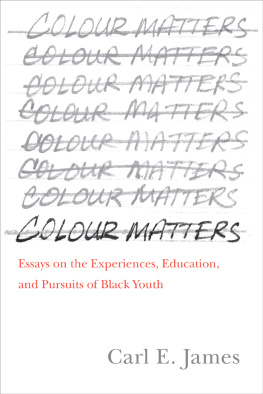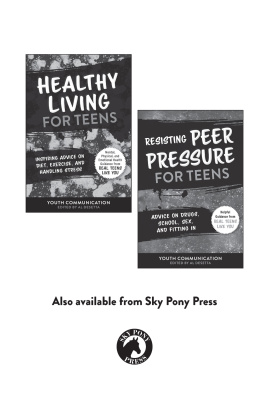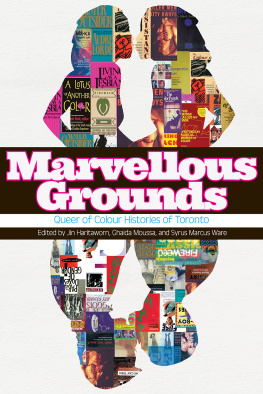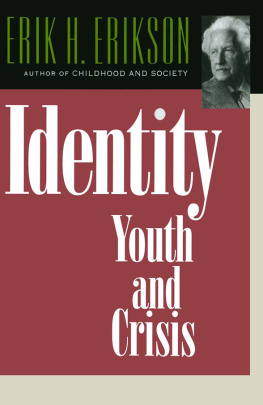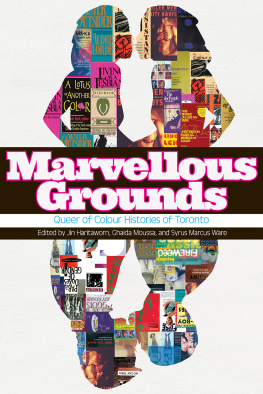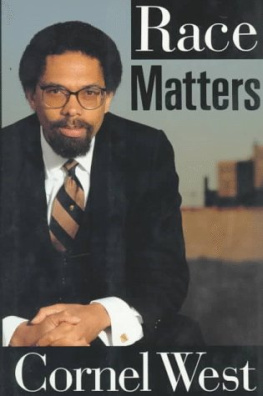Landmarks

COLOUR MATTERS
Essays on the Experiences, Education, and Pursuits of Black Youth
Based on research conducted in Black communities, along with over thirty years of teaching experience, Colour Matters presents a collection of essays that engages educators, youth workers, and policymakers to think about the ways in which race shapes the education, aspirations, and achievements of Black Canadians. Informed by the current socio- political Canadian landscape, Colour Matters covers topics relating to the lives of Black youth, with particular, though not exclusive, attention to young Black men in the Greater Toronto Area.
The essays reflect the issues and concerns of the past thirty years, and question what has changed and what has remained the same. Each essay is accompanied by an insightful response from a scholar engaging with topics such as immigration, schooling, athletics, mentorship, and police surveillance. With the perspectives of scholars from the United Kingdom, the United States, and Canada, Colour Matters provides provocative narratives of Black experiences that alert us to what more might be said, or said differently, about the social, cultural, educational, political, and occupational worlds of Black youth in Canada. This book probes the ongoing need to understand, in nuanced and complex ways, the marginalization and racialization of Black youth in a time of growing demands for a societal response to anti-Black racism.
CARL E. JAMES is a professor in the Faculty of Education at York University.
Colour Matters
Essays on the Experiences, Education, and Pursuits of Black Youth
CARL E. JAMES
UNIVERSITY OF TORONTO PRESS
Toronto Buffalo London
University of Toronto Press 2021
Toronto Buffalo London
utorontopress.com
Printed in the U.S.A.
ISBN 978-1-4875-0867-8 (cloth) ISBN 978-1-4875-3879-8 (EPUB)
ISBN 978-1-4875-2631-3 (paper) ISBN 978-1-4875-3878-1 (PDF)
Library and Archives Canada Cataloguing in Publication
Title: Colour matters : essays on the experiences, education, and pursuits of Black youth / Carl E. James.
Names: James, Carl E., author.
Description: Includes index.
Identifiers: Canadiana (print) 20200410644 | Canadiana (ebook) 20200410776 | ISBN 9781487508678 (hardcover) | ISBN 9781487526313 (softcover) | ISBN 9781487538798 (EPUB) | ISBN 9781487538781 (PDF)
Subjects: CSH: Black Canadians Ontario Toronto. | CSH: Black Canadians Ontario Toronto Social conditions. | CSH: Black Canadians Education Ontario Toronto. | CSH: Black Canadians Ontario Toronto Social life and customs. | LCSH: Toronto (Ont.) Race relations. | LCSH: Toronto (Ont.) Ethnic relations.
Classification: LCC FC3097.9.B6 J36 2021 | DDC 305.8960713/541 dc23
Funding for this publication came from the SSHRC Major Collaborative Research Initiative (MCRI) program and the Jean Augustine Chair in Education, Community & Diaspora, Faculty of Education, York University.
University of Toronto Press acknowledges the financial assistance to its publishing program of the Canada Council for the Arts and the Ontario Arts Council, an agency of the Government of Ontario.

Contents
For Maud Fuller, Jamaican-Canadian educator (19332013)
We could start with this story: A parent, herself a Black teacher, runs into her sons French teacher, who is white. She tells him that her son has transferred to one of the technical high schools. He congratulates her, assuring her that she has made the right decision since he tells her confidently her beloved child will be good with his hands.
Or we could begin by introducing a Black university student, also a parent, who leaves her seminar discussion almost every week as she keeps getting calls from her childs school about his disruptive behaviour. At one point, her son is physically restrained by a teacher. Efforts to challenge this including contacting the school superintendent continue all year. Unsatisfied with the responses she has received, she eventually transfers her son to another school, making her commute to his school and her university significantly longer. No changes are made at her sons former school.
Another student-parent learns that her son has been moved to a special education classroom without consultation. The special ed class is taught by the schools only Black teacher, and most of the students in that class look like her child.
The children in the above two stories are both five years old.
Or we could simply begin by reflecting on what it means to be a parent of Black children in North America, what it means to watch them grow into an understanding of themselves as part Caribbean as affirmation to be sure, but also as the expression of a tentative relation to a place where they were born and raised and schooled.
School (noun). A space where Black parents are acutely aware that our children spend most of their waking weekdays. Where big pieces of them are (de)formed. A space of damage. Where we are yet to understand the spiritual and psychic costs, even as we know that racism and mental health are inextricably linked (see Sinai Health System, Human Rights & Health Equity Office, 2017; Taylor & Richards, 2019).
School (verb). To put a person in their place.
Add up the experiences. Multiply the slights that are not slight at all. Divide and subtract. Take away the sense of a self that is valuable. This is not an abstraction.
* * *
In this thoughtful collection, Carl James walks us through the difficult calculus of young Black lives. The essays gathered here were published over the course of two decades and represent research with young people in Ontario conducted over an even longer period across NDP, Liberal, and Conservative governments. Taken together, these essays give rise to a temporal dissonance that is, to say the least, disconcerting: on one hand, the awful immediacy of the issues foregrounded in these pages; on the other, the long horizon of anti-Black racism. This dissonance is underlined in the chapters that track the subduing of Black aspiration in longitudinal surveys with young people. The essays are punctuated by responses from other Black educators, with titles that underline congruence across time and Black diasporic space (It Could Have Been Written Today: A Montrealers Reflection; Its the Same with Black British Caribbean Pupils; Black Lives Matter in the USA and Canada). The final essay, on consultation sessions with members of Black communities in the Greater Toronto Area in 2016, seems to reprise decades-old issues covered in earlier chapters. And the urgency of the times we inhabit let us be clear, this is a state of emergency is most starkly conveyed in the evidence James offers us, from Toronto District School Board figures, that when it comes to suspension, expulsion, and dropout rates, the figures are higher for succeeding generations of Black children (). What these data tell us, to put it bluntly, is that the longer Black folk are here, the worse it becomes.
In meticulous detail, and drawing on primary and secondary research, James lays out the materialization of anti-Black racism. This is the storying of how the Canadian school system produces the Black child as a problem, as academically inferior and unteachable. It does this via a series of systemic practices: stereotypes (like the trope of the Black male as immigrant, fatherless, athlete, troublemaker, underachiever); streaming; surveillance (in her response to ) surely a misnomer, since nothing is hidden when we take into account what a child hears, sees, senses, and feels.

